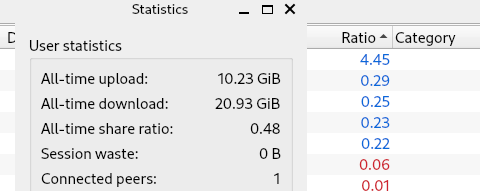- 19 Posts
- 52 Comments
I managed to fix this problem by pointing my domain name to my private IP address (with pihole’s local DNS entries), so I could access it. Then, I just got certs for the domain and applied them with nginx.
I know, but for some reason my router does not let me access my domain (with duckdns) when connected to my network. So even if I get certs for the domain, I will not be able to access it. I have set up local DNS entries (with Pi-Hole) to point to my srrver, but I don’t know if it possible to get certs for that, since it is not a real domain.
EDIT: Fixed it. (See reply for fix)
I installed Void Linux on my Raspberry Pi without looking at the details, and I was surprised that it had no systemd! It was the first non-systemd distro that I had encountered and also pretty fast.
Why doesn’t this post mention the price? It is an extremely important factor.

 1·2 months ago
1·2 months agoSo, OP has 45.57 gold medals only for his first torrent on the list?

 8·2 months ago
8·2 months ago
I am waiting for my medal

 5·2 months ago
5·2 months agoYes, basically on internal LAN I put admin admin to everything.

 2·3 months ago
2·3 months agoI wish I could like a comment twice on Lemmy.

 2·3 months ago
2·3 months agoI don’t dual boot, I just have some other Windows machines that I use rarely for Windows-only software that require an external connection, like Odin for Samsung devices.

 2·3 months ago
2·3 months agoext4 on everything except external drives where I put NTFS.
I just use ext4 on everything. It works pretty nicely.

 1·3 months ago
1·3 months agoI think you can encrypt drives by using a key stored in the TPM, if you have one. See the Arch wiki for info.
Though I have heard the TPM is not as secure..
I use root for the same things except for the battery management one.

 1·3 months ago
1·3 months agoI’d rather not. :)

 1·3 months ago
1·3 months ago- Not having to give up my privacy for everything.
- GUIs are not needed when self-hosting. (I mean when deploying services)
- Learn Linux and start simple with a Raspberry Pi or laptop. That’s how I started.

 3·3 months ago
3·3 months agoYes, I have little bandwidth so I always download low bitrate ones.

 3·4 months ago
3·4 months agoI don’t have any job that needs to run 24/7, so I poweroff my server at night (12 am) and start it in the morning using WOL.

 1·4 months ago
1·4 months agoOK, maybe I will think about some other use for the Raspberry Pi then.







We have finally found The Forbidden Knowledge